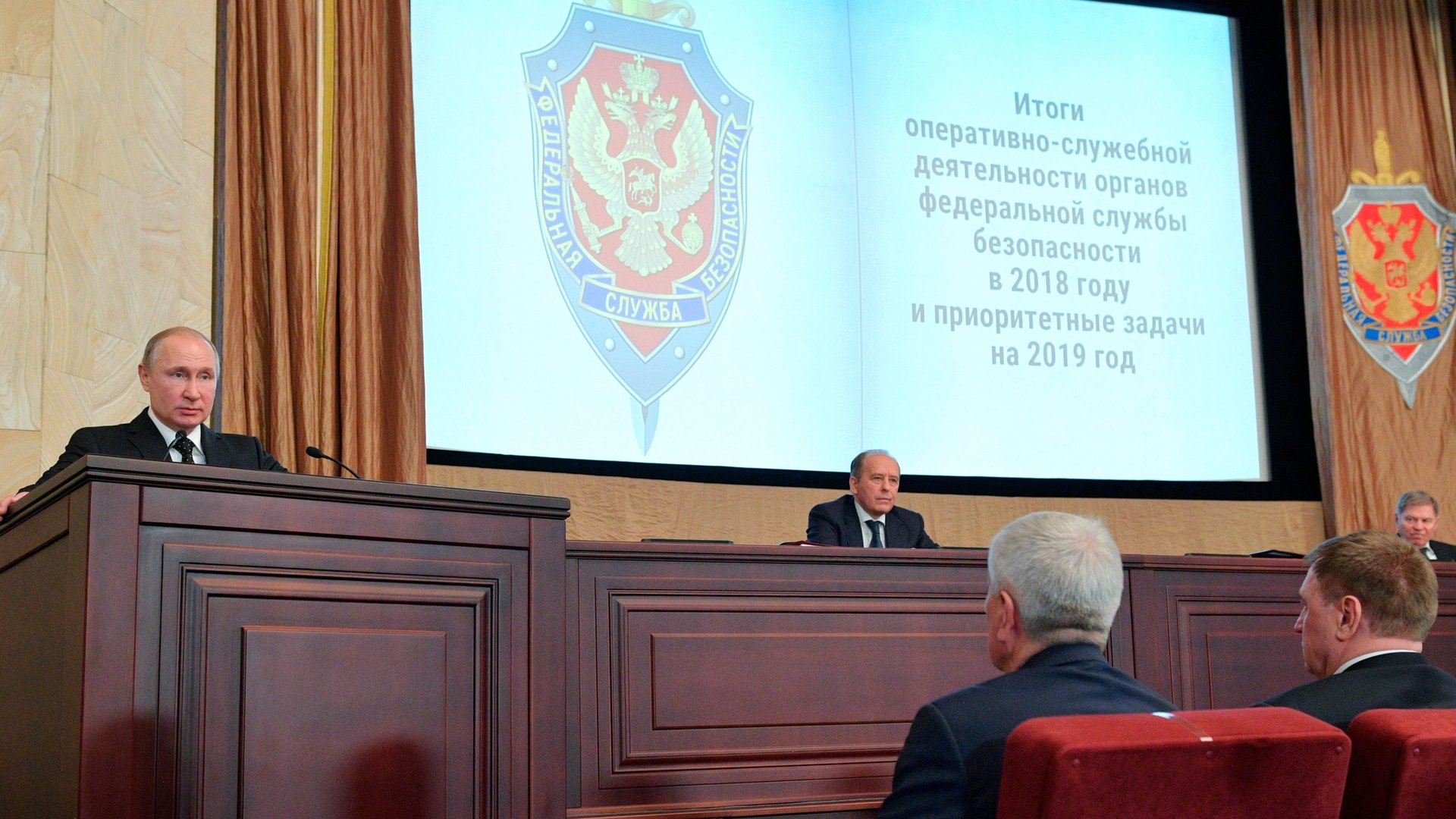Putin’s spy-busting claims are nonsense, but include an important warning
Russian president Vladimir Putin said Wednesday (Mar. 6) that the country’s security services identified nearly 600 foreign spies operating there in 2018, a number American operatives insist is wildly overblown.


Russian president Vladimir Putin said Wednesday (Mar. 6) that the country’s security services identified nearly 600 foreign spies operating there in 2018, a number American operatives insist is wildly overblown.
“As many as 129 staff members and 465 agents of foreign intelligence agencies were unmasked as a result of special operations,” Putin told top officials of Russia’s Federal Security Service (FSB), according to Russian news agency TASS. He said the outsiders “have been making every possible effort to get access to political, economic, scientific and technological information,” and “seek to influence the processes going on in our country.”
But according to three ex-CIA officers and one former FBI agent, there’s little chance Russian counterintelligence in fact rounded up 594 actual spies last year.
“I would guess the FSB is talking about everyone that is of interest to them: drugs and thugs, environmentalists, Tsarists—they do exist,” said Joseph Wippl, who spent 30 years in the CIA as an operations officer, posing as a US diplomat. “As to agents of a foreign power … it’s on one hand at most.”
Former CIA officer John Sipher, a 28-year veteran of the agency’s clandestine service who was posted in Moscow and ran the CIA’s Russia operations, agreed, calling the figure “absolutely ridiculous.”
“If they arrested 600 people, my guess is they arrested 600 innocent people,” Sipher said. “The overwhelming majority of people arrested as supposedly working for the US have zero connection to the US.”
In December, Paul Whelan, a corporate executive from Michigan, was arrested on espionage charges while in Moscow for a friend’s wedding. The details of Whelan’s case are still murky, but Sipher, for one, said he’s most definitely not CIA.
Casting the widest imaginable net
Retired CIA operations officer Charles Goslin called Putin’s claim of catching almost 600 spies last year “unrealistic on its face.”
“An ‘agent’ implies the contact is recruited,” said Goslin, parsing the difference between officers, who are professional spies, and agents, who are, in the simplest of terms, informants. “In the best years, that many recruited agents is a fraction of that number.”
It would be possible to get to 600 only if large numbers of foreign embassy staff were accused, without any substantive proof, of working for a country’s intelligence apparatus, explained Dennis Franks, a former FBI agent who supervised an intelligence squad during his 22 years with the bureau.
“I have my doubts that they actually developed evidence of this number, but I’m sure they are not short-staffed and have a robust counterintelligence program,” Franks said.
In 2017, Putin said the Russian security services reportedly picked up 72 foreign intelligence officers and 397 agents, according to TASS. In 2016, the Russian president said they stopped 53 intelligence officers and 386 agents.
A prelude to turmoil?
Conversely, Jan Neumann, the pseudonym used by a former FSB officer who defected to the United States in 2008, believes Putin’s math could well be accurate. It is entirely possible that the 600 “spies” rounded up last year included not only officers and agents, but also their networks of alleged sources, Neumann told Quartz, adding that they could have been surveilled for years before just now being outed.
The FSB’s work adheres to three main pillars, explained Neumann: detection, prevention, and suppression. “Lots of potential spy cases ended up in first and second stage,” he said.
Neumann said that the FSB is dealing with many more adversaries than the KGB did during the Soviet era, which could account in part for the increased numbers. In addition to ongoing espionage activities by the United States and European countries, he said, “half of former Soviet republics are working against Russia—Ukraine, plus the rest of the world, including [the] Chinese.”
There are specific targets in Russia that Neumann thinks foreign intelligence services are particularly interested in, such as details of recently-introduced weapons systems Neumann described as “two-to-three generations ahead of similar projects in US and/or NATO.” During Putin’s speech yesterday at FSB headquarters, he urged the agency to be on guard for adversaries attempting to steal information related to new weapons.
Putin’s claim of having arrested or identified 600 officers and agents, if accurate, might be taken as a harbinger of impending turmoil, Neumann cautioned.
“My main concern is that [an] increasing number of deployed spies and number of busted spies in NATO [countries], US, and in Russia is a very scary warning sign,” he said. “It looks like both parties are preparing for a war conflict. Could be proxy war or direct one, but both parties are checking and testing each other now.”